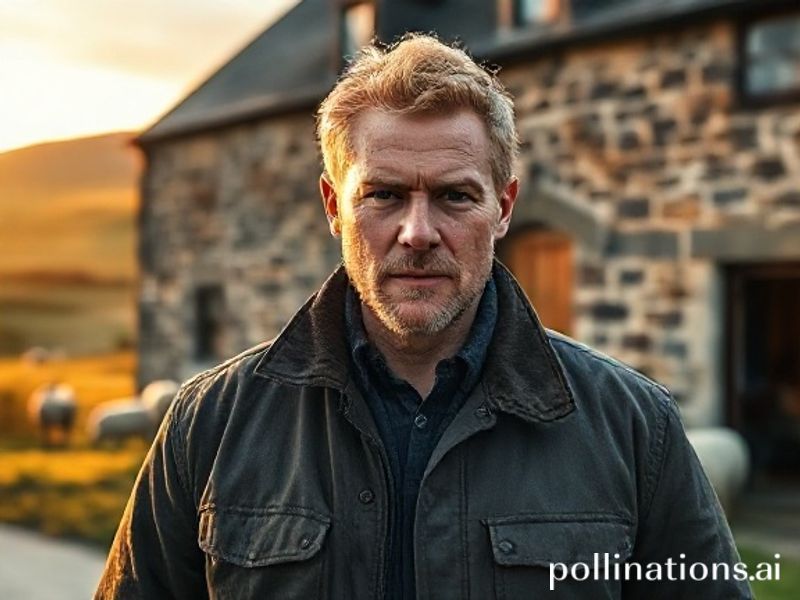How a Fictional Yorkshire Farmer Became the World’s Most Unexpected Gay Icon: The Global Phenomenon of Aaron Dingle
**The Ballad of Aaron Dingle: How a Fictional Yorkshire Farmer Became the World’s Most Reluctant Gay Icon**
*From the moors of Yorkshire to the mountains of Peru, humanity’s endless capacity for projected meaning finds its latest vessel in a soap opera character who just wanted to tend his sheep in peace.*
While the planet burns through its third consecutive hottest year on record and various apocalypses compete for our attention like desperate reality show contestants, approximately 6.7 million people across 68 countries have found something far more pressing to care about: the marital status of a fictional farmer named Aaron Dingle. This might seem statistically insignificant until you realize that number exceeds the population of Libya and represents more engaged citizens than most democracies can muster for actual elections.
Aaron Dingle, for the uninitiated heathens who’ve been busy with trivialities like climate change or that persistent cough, is a character from Britain’s Emmerdale—a soap opera so quintessentially British that it makes Brexit negotiations look like a Mexican fiesta. Played by actor Danny Miller with the perpetual expression of someone who’s just discovered his tax return was due yesterday, Aaron has become an unlikely international phenomenon, his romantic tribulations tracked with the intensity usually reserved for North Korean missile launches.
The global implications are, admittedly, microscopic. Yet in a world where Saudi Arabia’s crown prince allegedly orders bone-saw diplomacy and Amazon warehouse workers urinate in bottles to meet quotas, Aaron’s on-screen wedding to his boyfriend Robert (a pairing christened “Robron” by fans who clearly have too much free time) trended worldwide for 14 hours. This beat the #PrayForAmazonia hashtag by a solid six hours, proving that fictional gay farmers matter more to the global consciousness than actual burning rainforests.
From Tokyo to Timbuktu, viewers who can’t locate Yorkshire on a map have invested more emotional energy into Aaron’s various breakups than their own relationships. Indonesian fan accounts translate his dialogue into Bahasa. Mexican viewers host viewing parties where they drink tequila every time Aaron punches someone (liver damage is reportedly epidemic). In Russia—where “gay propaganda” laws make his very existence technically illegal—underground viewing clubs gather in secret, proving that human beings will risk imprisonment for the right to watch fictional British people suffer.
The economic implications are equally absurd. Fan conventions in Brazil sell out faster than Copacabana during Carnival. Official merchandise—including “Team Aaron” mugs made in Chinese factories with working conditions that would make Aaron’s character punch a wall—generates revenue that could probably fund actual rural English communities. Tourism boards report increased visits to Yorkshire from Americans who expect every pub to contain a brooding farmer with perfect cheekbones and trauma. They are, predictably, disappointed.
What does this tell us about humanity? Perhaps that in an era of infinite content and finite hope, we’ve evolved to care passionately about problems we can safely forget. Real-world issues require uncomfortable action; Aaron’s problems resolve in 22-minute segments with commercial breaks. He’s poverty-porn for the privileged, allowing viewers to feel progressive by supporting a gay character while ignoring actual LGBTQ+ refugees. He’s working-class cosplay for middle-class audiences who’ve never met a farmer but feel spiritually connected to agricultural struggle.
As the planet hurtles toward various cliffhangers—climate catastrophe, democratic collapse, that asteroid that’s definitely coming someday—Aaron Dingle soldiers on, a fictional beacon in our collective denial. His greatest gift isn’t representation or entertainment; it’s providing a contained tragedy where the stakes are pleasantly low. When Aaron suffers, nobody has to bomb Syria or explain vaccine hesitancy. We can simply tweet our outrage and feel appropriately human.
In the end, perhaps that’s exactly what we need: fictional problems for our fictional concern, leaving us properly refreshed to ignore the real ones. Aaron Dingle isn’t just a character; he’s humanity’s emotional safety valve, releasing pressure we might otherwise spend on things that matter. In a world gone mad, there’s something almost sane about that.







